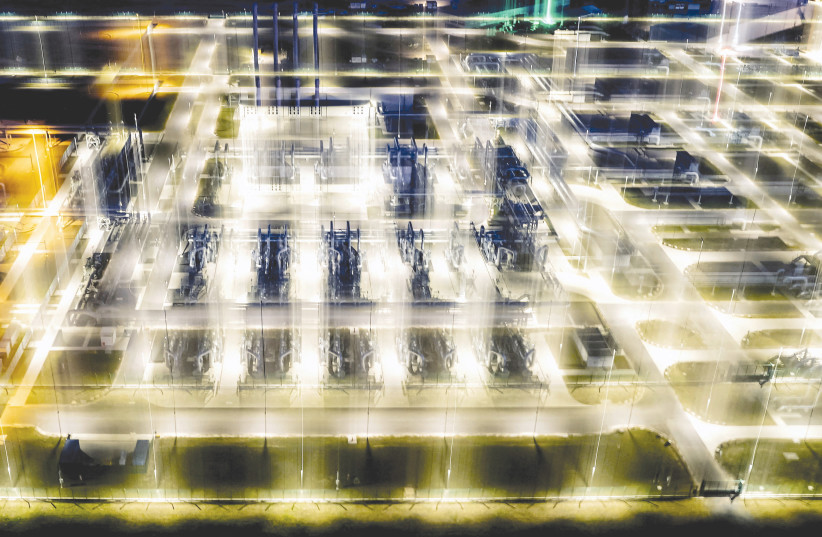It’s more than seven weeks into the war in Ukraine, and the global security and energy picture is looking increasingly bleak. For Europe, there are now more questions than answers. How can it hope to gain any significant leverage until it cuts off Russian gas fully? How can the continent wean off Russian gas without self-inflicting a severe energy crisis or economic recession? Which nations can Europe trust to supply it with the energy it needs?
Beyond needing spare capacity, plentiful reserves and existing infrastructure, those countries that wish to replace Russia and furnish Europe with their oil and gas will also have to demonstrate that they are reliable and dependable. Few countries fit the bill, although Israel emerges as a natural candidate, thanks to its proximity to Europe, offshore reserves and proven track record of being a good friend to Europe.
According to Israel’s Energy Ministry, up to 26 billion barrels of oil and some 7,700 billion cubic meters (bcm) of natural gas are present in the Israeli-controlled area of the Mediterranean basin. The EastMed pipeline that would connect Israel’s offshore reserves to Europe, through Cyprus and then Greece, lost support from the US in January of this year. If full-scale construction started today, it would not be completed before 2027. The European Commission’s March 8 announcement, however, targets a reduction in demand for Russian gas of two-thirds before the end of this year. Israel cannot fill these shoes in time.
Other options need to be considered. One country stands out in particular, and that is Azerbaijan.
Over the past year, Baku has emerged as a rising diplomatic power. Under the leadership of President Aliyev, they have developed and maintained close relations with Turkey, Israel, the Gulf states and even balancing its relations between Russia and the European Union. The Azerbaijani government recently announced its full support of the normalization of relations between Turkey, its closest ally, and Armenia, a long-time foe. In a complex geographic region, at the nexus of different powers and pariah states (Russia to the north and Iran to the south), Azerbaijan has been successful in charting its own course and maintaining stable relations with all of its neighbors.

While Baku passes the crucial reliability test, it also possesses two other critical elements to become Europe’s new energy supplier: spare capacity and existing infrastructure. The Southern Gas Corridor (SGC) is a collection of pipelines that connects Baku to Italy. It passes through Georgia (South Caucasus pipeline), Turkey (Trans-Anatolian pipeline), and then Greece (Trans-Adriatic pipeline). There are ongoing discussions to connect Israel’s gas through this corridor to save time and money.
OPERATIONAL SINCE the start of 2021, the SGC pumped 16 bcm of gas in its first year, with Turkey receiving six bcm and Europe 10 bcm. At the onset of Russia’s war on Ukraine, Azerbaijan announced that it could immediately supply Europe with an additional 0.5 bcm of gas. And that was before other Caspian producers get involved.
Situated on the Caspian’s western side, Azerbaijan serves as the ideal link between Europe and two mass producers of hydrocarbons on the eastern side of the sea: Turkmenistan and Kazakhstan. The former is particularly well-placed to supply its gas to Europe.
Turkmenistan, historically the most reclusive of all the Central Asian republics, is now undergoing regime change. As of March 12, Serdar Berdimuhamedov, the 40-year-old son of the previous president, assumed the highest office. The country’s gas reserves are estimated to be the world’s fourth-largest, representing about 10% of global supplies. However, the country has been beholden to Russia and then China to sell its gas. Under new leadership, and someone who will want to make an economic mark quickly, Turkmenistan might be keen to export its gas to Europe.
Turkmenistan has spare production capacity and is still flaring – the antiquated practice of burning natural gas during oil extraction. It can feed production into existing pipelines, which would supply as much as 10 bcm of gas within a matter of months. This is a volume that no other source of pipeline gas can match. Additionally, the idea of a new, relatively short 78-km. (48-mile) line to connect Turkmenistan’s offshore Magtymguly oil field to existing gas gathering facilities in Azerbaijani waters is gaining traction. Azerbaijani sources indicate that such a line could be operational within four to six months of approval and provide an additional 10 bcm of gas.
The addition of Kazakhstan’s gas would have been ideal. However, since the turn of the year, it has proved to be a less than reliable partner. After a series of protests swept the country in early January, President Tokayev responded with repressive and violent actions, killing hundreds of protesters. He arbitrarily arrested thousands, including former politicians such as the internationally well-regarded former prime minister Karim Massimov. He then welcomed Russian troops to “stabilize” the country, placing himself deeper into the Kremlin’s pockets.
While Kazakhstan has at least refused to support Russia’s invasion of Ukraine, Putin and Tokayev have held some 11 meetings and phone calls over the last four months. Tokayev has repeatedly thanked Putin for sending Russian forces, calling him a “comrade.” It is difficult to imagine that Europe will want to trade its energy security from one erratic autocrat to the next.
Reducing dependency on Russian oil and gas by two-thirds means that Europe will have to find a whopping 100 bcm of gas by the end of the year. While no single country will be able to fill this gap immediately, a consortium of countries is stepping up as viable candidates. Led by Azerbaijan, the Southern Gas Corridor may be Europe’s best solution.
The writer is an associate fellow for geoeconomics and strategy with the International Institute for Strategic Studies. He served as deputy assistant secretary for European and Eurasian affairs at the US Department of State, and at the National Security Council as director for South and Central Asia.
